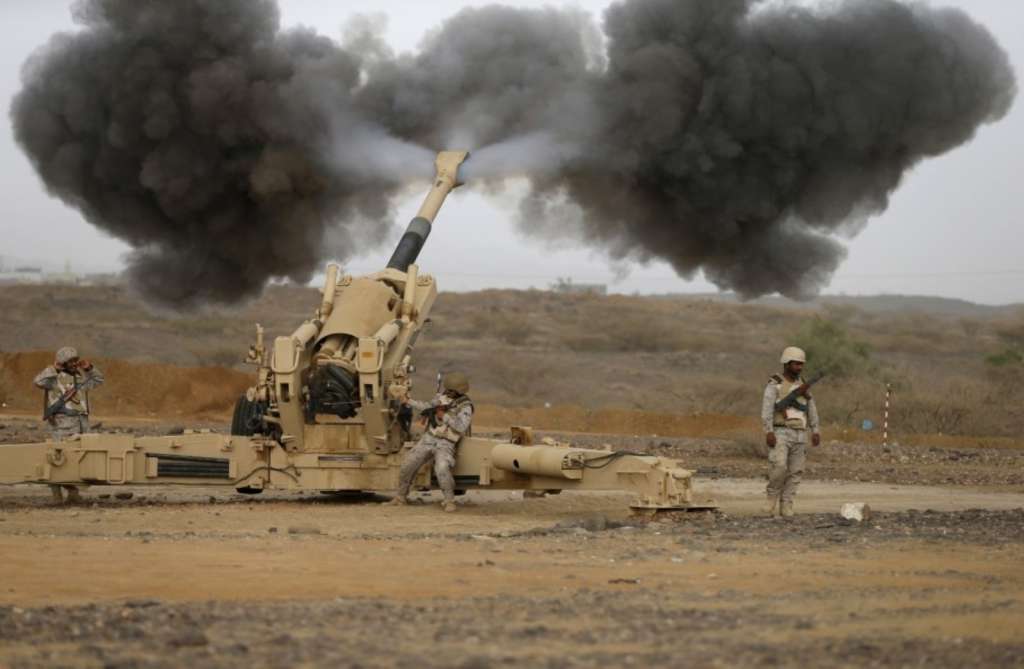Jeddah – The insurgents in Yemen recently acknowledged that they had launched on Thursday a ballistic missile towards a military base in the Mecca region in Saudi Arabia, reported a news agency affiliated with the coup in the war-torn country.
An observer only needs Google Maps or any similar app to determine just how close the King Fahad Air Base is to the Great Mosque of Mecca. The Arab Coalition air defense had managed to intercept Thursday’s missile. The launch was deemed by observers as an attempt to “ruin the Hajj pilgrimage season.”
This is not the first time that the insurgents acknowledged that they had targeted Saudi Arabia. They sought in October 2016 to strike Jeddah’s King Abdulaziz International Airport, which also lies in the Mecca region. The facility is the primary arrival point of the majority of pilgrims headed to Mecca.
What is worrisome is not the ballistic threat alone, but the fact that the missile, according to experts, could be manipulated to increase its range. This consequently reduces its accuracy and makes it veer off its trajectory, which means it could land in civilian areas, most notably injure pilgrims.
The Islamic world and international community are expecting the Organization of Islamic Cooperation (OIC) to hold an emergency meeting within the upcoming days to address the Houthi and Saleh militias’ targeting of Mecca.
Political observers expect the 56-member OIC to hold a meeting that would call for tangible action to thwart the Houthi and Saleh violations. This stance will come in light of a November 2016 meeting of Islamic country foreign ministers, who had taken a collective stand against the first Mecca attack and those behind it.
OIC Secretary General Dr. Youssef al-Othaimeen condemned Thursday’s failed attack, saying that it confirms “without a doubt, the Houthi and Saleh militias’ insistence to target holy sites in Saudi Arabia.”
These attacks are part of conspiracies against the kingdom and its residents and are a “desperate” attempt to destabilize the Hajj season, said an OIC statement quoting Othaimeen.
This is an attack against all Muslims throughout the world due to the holiness of the Great Mecca Mosque and its importance in Islam, he continued, noting that the assault “clearly demonstrates that the Houthi and Saleh militias are not serious about ending the Yemen conflict in peaceful means.”
He renewed his support for the legitimate Yemen government and United Nations efforts aimed at finding political solutions that would achieve the country’s security while preserving the unity of its territories. He also hailed Saudi Arabia’s constant efforts to achieve peace in Yemen, voicing the OIC’s solidarity with it and all the measures it takes to maintain its stability and security.
An Arab Coalition statement revealed that Thursday’s missile landed 69 kilometers away from Mecca city. It fell in the al-Wasiliya, which is one of the main travel routes taken by the pilgrims on their way to Mecca.
The statement added that the continuation of the smuggling of rockets to Yemen stems from the lack of monitoring of the Hodeidah Port. It can also be attributed for the misuse of permits granted by the Coalition to relief and goods shipments at a time when the international community has been unable to take a decision that would thwart these violations that are prolonging the war and endangering the lives of civilians.
Political expert Nayef al-Raqaa revealed that Thursday’s missile was a Scud that was developed by Iran. It has a range of 300 to 700 kilometers and is not effective as its warhead weighs no more than 250 kilograms. It is inaccurate and should it strike its target, there would be no trace of the rocket.
